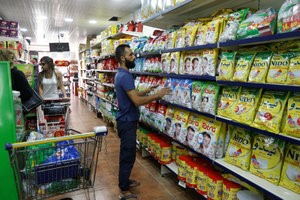By Lisa Barrington
BEIRUT (Reuters) - Lebanon has begun reforms to repair its fragile economy after years of paralysis in decision-making but is under pressure to do more to prevent its rising debt spinning out of control.
President Michel Aoun, elected last year after 29 months without a head of state, signed off last week on public sector pay rises and tax increases to cover their cost -- part of a series of government moves that have prompted Moody's rating agency to lift its outlook for Lebanon to stable from negative.
But finance ministry estimates indicate the measures will have little impact on the fiscal balance or debt burden, the world's third highest in terms of debt-to-GDP ratio and the main reason why Moody's has also downgraded its credit rating.
Economists are calling for other reforms to boost revenue and stop the debt rising, including passing a budget, reforming the heavily subsidised electricity sector, raising fuel tax and tax collection and improving the investment environment.
"They've gotten government working again, they've gotten institutions moving again. The hope is they start tackling those major issues with the same seriousness and effectiveness," said Wissam Harake, a World Bank economist based in Beirut.
Until Aoun was elected on Oct. 31 last year, Lebanon had gone nearly two-and-a-half years without a president because parliament was unable to agree on a candidate.
Since then, Prime Minister Saad Hariri's government has taken steps to improve stability and boost the economy by agreeing legislation intended to kick-start the development of its oil and gas industry and passing an electoral law paving the way to a parliamentary election next year.
"The stable outlook reflects the return to a fully-functioning government, which will support reform momentum going forward," Moody's said.
LITTLE TO SPEND ON INFRASTRUCTURE
Economic growth has been battered by six years of war in neighbouring Syria and political divisions, slowing to just over 1 percent a year from an average of 8 percent before the Syrian war, officials have said.
Lebanon's debt has also risen strongly since Syria's civil war began in 2011. Moody's says the debt-to-Gross Domestic Product ratio, which indicates a country's ability to pay back its debt, will reach almost 140 percent in 2018.
"Recent fiscal reforms are very unlikely to reduce the deficit in 2017 and 2018 ... further action will be needed to reverse the rising debt trajectory," Moody's said on Saturday, changing its rating to B3 from B2.
With revenues and growth low, the country relies on deposits made into local banks by millions of expatriate Lebanese. The banks buy government debt which finances the expanding budget deficit and debt.
But deposits are sensitive to political risk and economists say the government needs to generate higher revenues and boost growth to put the economy on a firmer footing.
Debt interest payments in 2016 accounted for about 48 percent of Lebanon's domestic revenues, up from 38 percent in 2014, said Harake, the World Bank economist.
With large sums spent on subsidising the antiquated electricity sector, Lebanon has little revenue left to upgrade water, telecoms, roads and other crumbling infrastructure needed to encourage tax-generating industry and growth.
CENTRAL BANK'S ROLE
The International Monetary Fund wants the government to raise taxes, particularly on fuel, and strengthen tax compliance to stem debt growth but Lebanon's business community says the proposed increases would undermine growth.
Garbis Iradian, chief Middle East and North Africa economist for the Institute of International Finance, a global association of financial institutions, said the increases might result in some short-term inflationary pressure but were needed.
"Lebanon is undertaxed," he said, comparing it to countries such as Turkey, Morocco and Jordan.
Lebanon's central bank quietly steered policy in the absence of political leadership, using stimulus packages and costly financial engineering to keep foreign reserves stable and growth ticking over.
Central bank Governor Riad Salameh has said he will stabilise the economy for "as long as it takes" for the government to become more effective, pass a budget and tackle the structural deficit.
Financial sources say confidence in Salameh is high, but economists and bankers have said the central bank cannot carry the burden indefinitely.

"Without the government coming in with structural reform then monetary policy or central bank activity by itself cannot solve long-term structural issues," Harake said.